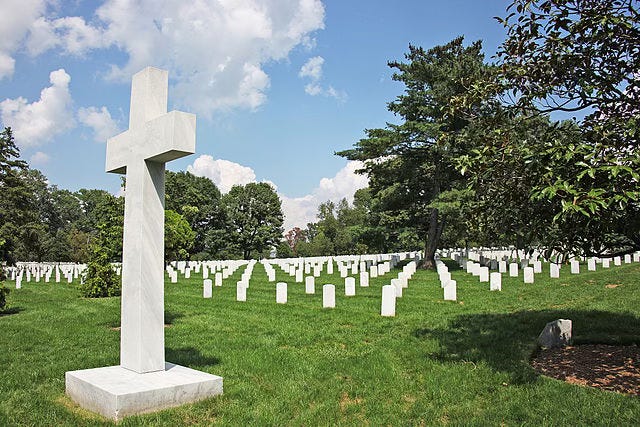Memorial Day is a supernatural answer to a natural human sorrow. Nothing, after all, could be more natural or more painful than to mourn fallen soldiers. Eulogies for them are among our oldest and noblest forms of literature. Childish hippie fantasies aside, building a civilization means protecting it from threats of destruction or conquest. Even good countries have to fight ugly battles for turf and trade. Grief over this terrible necessity is inseparable from pride and gratitude for the way of life that has to be bought with courageous death. Nothing could be more natural. And nothing could be harder to bear.
Memorial Day in America emerges out of a unique and profound response to this universal human situation. The defining war of the holiday, the one it was founded to commemorate, is the Civil War. It’s a contentious question where the tradition started, because “Decoration Day,” as it was called in the 1860s, began in the aftermath of our most wrenching trial. Major General John A. Logan issued the inaugural proclamation of the holiday with an impassioned tribute to the victors: “Their soldier lives were the reveille of freedom to a race in chains and their deaths the tattoo of rebellious tyranny in arms.”
Understandably for a man who went to battle alongside them, Logan paid homage exclusively to the Union soldiers and their righteous cause. As commander-in-chief of the Grand Army of the Republic, he was charged specifically with representing the veterans of the North. But he may have felt compelled to stress that allegiance because widows in the South were already laying claim to graveside honors for the men they had lost—the men who died fighting for secession and yes, for slavery.
Each of those men had his own reasons for putting on the gray uniform. Plenty of them fought, as soldiers always have, out of simple attachment to their homes and families. But in the final crisis, the war itself decided whether America would persist in her most shameful practice or not. Did the soldiers who fought to maintain that practice deserve commemoration?
A devastating question. When Pericles delivered his epochal speech for Athenian soldiers killed in the war against Sparta, his theme was the pre-eminence of Athens, “the school of all Greece,” over every other city. No one would have expected him in that moment to sing the praises of Sparta’s dead as well. It would have been out of the question. Let Athenians bury Athenians, and let enemy armies look after their own. That was the obvious, even the honorable principle.
What makes the memory of civil war so painful is the way it twists that principle against itself and sets even our healthiest instincts at odds with each other. The Union’s very success made America into its own defeated enemy. Americans were both the victors and the vanquished. Perhaps that’s why the whole country was struck when, shortly before Logan made his declaration, a group of Mississippi women strewed flowers across the graves of both Confederate and Union soldiers.
It was a radical gesture, impossible to make sense of in words. But it was an impossible situation, and this was the only kind of act that seemed to hold out any hope of easing the torment. The poet Francis Miles Finch wrote an elegy inspired by the event, “The Blue and the Gray,” in which he imagined rival countrymen meeting over the horizon of death: “These in the robings of glory, / Those in the gloom of defeat, / All with the battle-blood gory, / In the dusk of eternity meet.”
That idea remains astonishing. It’s the sort of thing only a Christian country could bear to dream up. We are used to quoting the beautiful words of Abraham Lincoln’s Second Inaugural: “With malice toward none; with charity for all,” he pleaded, “let us strive on…to bind up the nation’s wounds.” But charity for all, in practice, can be an emotionally bruising affair. Charity is the last thing anyone has any right to expect from a freed slave or a war widow. “Everyone thinks forgiveness is a lovely idea until he has something to forgive,” wrote C.S. Lewis in Mere Christianity. This kind of memorial does not come easily. It is more than natural.
Lewis, a veteran himself, wondered whether it was possible that divine love could encompass both sides of the same war. “I have often thought to myself how it would have been if, when I served in the first World War, I and some young German had killed each other simultaneously and found ourselves together a moment after death. I cannot imagine that either of us would have felt any resentment or even any embarrassment. I think we might have laughed over it.” There was no firmer patriot than Lewis, no more serious believer in the morality of England’s cause. But like Finch before him, he thought it was possible that men who had to suffer the agony of earthly warfare might find themselves reconciled by unearthly mercy.
It was in that spirit that those widows came bringing their flowers. It wasn’t a natural sentiment that prompted them; in fact, if we take their act seriously, it strikes against some of our most basic instincts and our warmest passions. As humans we have every reason to feel attachment to our own, every right to insist that our cause is just and our opponent’s is not. But America, unlike Pericles’ Athens, was founded under the auspices of a more than merely human vision. Lincoln was convinced that only divine mercy could put an end to divine judgment and bring the war to a definitive close. That’s why he could hope that even after all that bloodshed, his countrymen might look on one another in compassion.
Without that hope, without that conviction, it’s hard to see how we can ever bind up our own wounds. Today we are more likely to topple Confederate memorials or melt them into scrap metal than leave flowers on them. Not just Confederate memorials, either. Monuments to Lincoln himself were desecrated in the violent national fit of retribution for prior sins, real and imagined, that dominated the year 2020. Still others have been vandalized in subsequent outbursts of factional rage. As we lose our grip on the Christian faith that defined the country, the wounds of all our old conflicts are splitting open again. This, too, is perfectly natural.
Americans are bewildered and dismayed by the tribalism that has seized us almost against our will. That’s because we take our religious heritage for granted and we expect social harmony to come naturally without it. We still have yet to understand how unnatural our fellowship is in the grand scheme of things, how much more normal it is to devolve into sectarian hatred. Basically everyone feels the impulse to lionize his ancestors and desecrate the tombs of his enemies. If grief for your fallen comrades is a human constant, so are endless cycles of vengeance for generational wrongs.
What’s not normal—what’s strenuous, and unfair, and shocking—is mercy. That’s why the consummate image of it is God himself unjustly executed, entering the trenches of our world and bleeding the same blood we do. In the shadow of that appalling spectacle all human life becomes a pitiable thing, a heartbreaking disaster that cries out for limitless compassion. Alongside our natural sentiments, arching like the dome of heaven over even our just wars, there is a spirit that grieves every sinner’s death. From that perspective we can begin to see our way, just barely, to forgiving those who trespass against us.
This kind of mercy has been an insult to the heart from the moment it was offered, which is probably why we are doing everything we can now to reckon up our national sins without it. But that kind of reckoning never seems to come out square, and it never will. Unless we can believe in a forgiveness that streams through and past the gates of death—unless that forgiveness becomes a hard-bitten reality for us, and not just a pleasant abstraction—we will never put our grief to rest. Reparations won’t do it; neither will patriotic speeches or secular niceties. Our country was founded, our wars were fought, in the light of the God who died for mercy. Our only hope is in the knowledge that he is real.
Image: Tim1965, CC BY-SA 3.0, via Wikimedia Commons.






The Civil War, or The War Between the States, when I was a kid, or the War of Northern Aggression in much of the south (and still is, at least in parts of LA), is a bit more complex than just saying it was fought over slavery.
Lincoln was, naturally, against slavery, but in favor of abolishing it by law, rather than force. His main objective, however, was the preservation of the union. Following is an excerpt from his famous letter to Horace Greeley:
“I would save the Union. I would save it the shortest way under the Constitution. The sooner the national authority can be restored; the nearer the Union will be ‘the Union as it was.’ If there be those who would not save the Union, unless they could at the same time save slavery, I do not agree with them. If there be those who would not save the Union unless they could at the same time destroy slavery, I do not agree with them. My paramount object in this struggle is to save the Union, and is not either to save or to destroy slavery. If I could save the Union without freeing any slave I would do it, and if I could save it by freeing all the slaves I would do it; and if I could save it by freeing some and leaving others alone I would also do that.”
Lincoln had already drafted the Emancipation Proclamation, but hadn’t an opportune time yet to release it. The Greeley letter was written some four weeks before the Battle of Antietam / Sharpsburg, which was both the bloodiest single day in American history and enough of a victory for Lincoln to publish the Proclamation.
I further believe war could have been avoided, and slavery would have waned away, dying out under mounting social and international pressure. But that’s another issue for another day.
So incredibly written. Thank you!